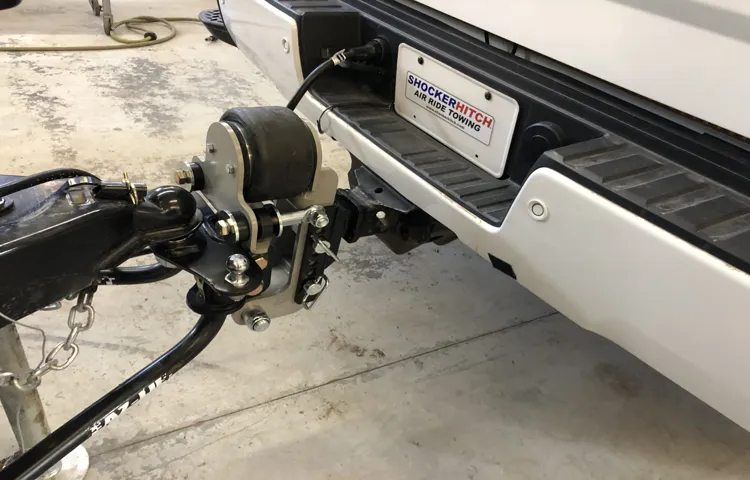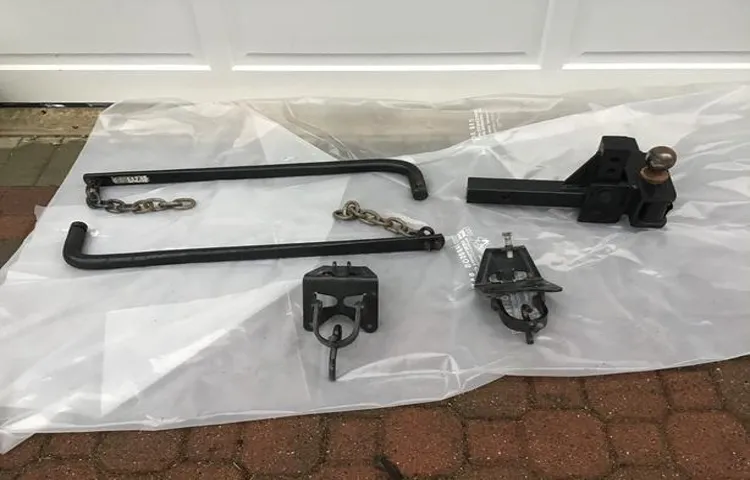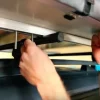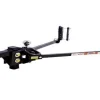Hey there, fellow road warriors! Are you a proud owner of a trailer or a camper? If so, then you know the importance of having a smooth and safe towing experience. One key tool that can greatly enhance your towing setup is an equalizer hitch. But what exactly is an equalizer hitch and do you really need one? Let’s dive in and find out! Imagine yourself driving on the highway, your trailer swaying dangerously from side to side, making your heart race with every gust of wind.
Not only is this nerve-wracking, but it can also be extremely dangerous for you and other drivers on the road. This is where an equalizer hitch comes to the rescue. An equalizer hitch, also known as a weight distribution hitch, is a device that helps distribute the weight of your trailer or camper more evenly across the axles of your towing vehicle.
It uses a combination of spring bars and chains to keep your trailer stable and prevent it from swaying or fishtailing while you’re cruising down the road. Think of an equalizer hitch as the superhero of towing. Just like a superhero uses their powers to maintain balance and stability in chaotic situations, an equalizer hitch keeps your towing setup in check, ensuring a smooth and controlled ride.
It acts as a buffer between your towing vehicle and the trailer, absorbing any bumps or movements and distributing the weight more evenly, reducing excessive strain on your vehicle’s suspension and brakes. But do you really need an equalizer hitch? Well, it depends on a few factors. If you’re towing a small, lightweight trailer with a vehicle that has a high towing capacity, you might be able to get away without using an equalizer hitch.
However, if you’re towing a larger, heavier trailer with a vehicle that has a lower towing capacity, an equalizer hitch is highly recommended. Just like wearing a seatbelt while driving, using an equalizer hitch is all about ensuring the safety of yourself, your passengers, and other drivers on the road. It provides stability, control, and peace of mind, making your towing experience much safer and more enjoyable.
So, the next time you hit the road with your trusty trailer or camper, consider investing in an equalizer hitch. It may just be the superhero your towing setup needs to conquer any road, weather, or wind conditions. Happy towing!
Table of Contents
What is an Equalizer Hitch?
So, you’re considering hitting the road with your trailer, but you’re wondering if you need an equalizer hitch. Well, let me break it down for you. An equalizer hitch, also known as a weight-distribution hitch, is a device that helps distribute the weight of your trailer more evenly across the axles of your tow vehicle and trailer.
This can be especially useful when towing heavy loads or traveling long distances. So, why would you need one? Well, imagine driving down the highway and feeling your trailer swaying back and forth behind you. Not only is this unnerving, but it can also be dangerous.
An equalizer hitch helps to minimize trailer sway, providing a smoother and more stable ride. But that’s not all. An equalizer hitch also helps to level out your tow vehicle and trailer, ensuring that they are sitting at the same height.
This can improve handling and control, making your towing experience safer and more enjoyable. Now, I know what you might be thinking. “Do I really need an equalizer hitch? Can’t I just rely on my tow vehicle’s built-in towing capabilities?” Well, while many trucks and SUVs are equipped to tow heavy loads, an equalizer hitch can still provide added stability and control.
It’s like adding an extra layer of security to your towing setup. So, to answer the question, do you need an equalizer hitch? It ultimately depends on the specific towing setup and the weight of your trailer. If you’re towing a lighter load and feel confident in your vehicle’s towing capabilities, you may be able to get away without one.
However, if you’re planning on towing a heavier load or want that extra peace of mind, investing in an equalizer hitch is a smart choice. After all, it’s better to be safe than sorry when it comes to towing on the open road.
Definition of an Equalizer Hitch
equalizer hitch An equalizer hitch, also known as a weight distribution hitch, is a device used to evenly distribute the weight of a trailer across the towing vehicle. It is commonly used when towing heavy loads or trailers that are susceptible to swaying. The hitch consists of a hitch receiver, spring bars, and a tension system.
The spring bars help to distribute the weight of the trailer to the front axle of the tow vehicle, making it easier to control and reducing the strain on the rear axle. The tension system allows the user to adjust the amount of weight distribution depending on the load being towed. By using an equalizer hitch, the trailer is level and stable, resulting in a smoother and safer towing experience.

How an Equalizer Hitch Works
equalizer hitch, weight distribution, towing experience, trailer, vehicle, safety, control, load distribution, sway control, towing capacity, driving stability. An equalizer hitch, also known as a weight distribution hitch, is an essential tool for improving your towing experience. When you’re towing a heavy trailer with your vehicle, it’s important to ensure that the load is distributed evenly between the trailer and the vehicle.
This is where an equalizer hitch comes in. It helps to distribute the weight of the trailer across all four wheels of the towing vehicle, providing better control and stability while driving. By using an equalizer hitch, you can effectively distribute the load between the trailer and the towing vehicle, preventing the rear of the vehicle from sagging due to the heavy weight.
This not only improves the towing capacity of the vehicle but also ensures a safer and more comfortable towing experience. One of the key features of an equalizer hitch is sway control. When you’re towing a trailer, sway can be a major concern as it can cause the trailer to oscillate from side to side, making it difficult to control the vehicle.
An equalizer hitch helps to minimize sway by distributing the weight evenly and stabilizing the trailer. This improves the driving stability and makes your towing experience safer and more enjoyable. Overall, an equalizer hitch is a crucial tool for anyone who tows heavy trailers.
It ensures proper load distribution, improves safety and control, and provides a more stable towing experience. If you’re planning to tow a heavy trailer, investing in an equalizer hitch is definitely worth considering. It will not only make your towing experience easier but also give you peace of mind knowing that you’re towing safely and responsibly.
Benefits of an Equalizer Hitch
Equalizer hitch is a device that helps improve the towing experience and overall safety when hauling heavy trailers. It is especially beneficial for those who tow trailers with a weight distribution problem, such as travel trailers or large boat trailers. An equalizer hitch works by redistributing the weight of the trailer more evenly across the tow vehicle and trailer axles.
This helps to reduce the sway and bouncing of the trailer, providing a smoother and more stable ride. Additionally, an equalizer hitch can also help to improve braking performance by ensuring that the weight of the trailer is distributed properly to all four wheels of the tow vehicle. This can help to reduce the chances of skidding and provide more control when stopping.
Overall, an equalizer hitch is a valuable tool for towing enthusiasts as it helps to improve safety, stability, and control while on the road.
Do You Need an Equalizer Hitch?
So you’re considering towing a trailer and you’ve heard about equalizer hitches, but you’re not sure if you really need one? Well, let’s take a closer look at what an equalizer hitch does and whether or not it’s necessary for your towing setup. An equalizer hitch is designed to distribute the weight of your trailer more evenly across the axles of your tow vehicle. This can help to improve stability and control while towing, especially when hauling heavy loads or longer trailers.
If you frequently tow large trailers or carry heavy cargo, an equalizer hitch can be a valuable investment. It can also make towing more comfortable and less strenuous on your vehicle, as it helps to minimize the effects of swaying and bouncing. Additionally, an equalizer hitch can help to maintain the proper balance of your towing setup, ensuring that weight is distributed correctly for safe and efficient towing.
However, if you mainly tow smaller trailers or lighter loads, an equalizer hitch may not be necessary. It ultimately depends on the specific towing conditions and your comfort level. So before hitching up and hitting the road, consider the type of trailer you’ll be towing and the weight you’ll be hauling.
This will help you determine whether or not an equalizer hitch is a necessary addition to your towing setup.
Factors to Consider
Equalizer hitch An equalizer hitch is a type of towing accessory that helps distribute the weight of a trailer more evenly between the towing vehicle and the trailer itself. This can be particularly useful when towing heavy loads, as it helps to improve stability and control while on the road. However, not everyone may need an equalizer hitch for their towing needs, and there are a few factors to consider before deciding whether or not you need one.
The first factor to consider is the weight of the trailer you will be towing. If you will only be towing a small trailer with a relatively light weight, then an equalizer hitch may not be necessary. These hitches are typically recommended for trailers that weigh around 5,000 pounds or more.
If your trailer falls within this weight range, then an equalizer hitch can greatly improve your towing experience. Another factor to consider is the type of towing vehicle you have. Some vehicles, such as trucks or SUVs, may already have built-in features that help with weight distribution and control while towing.
In these cases, an equalizer hitch may not be as necessary. However, if you have a smaller or lighter vehicle that may not have these built-in features, an equalizer hitch can provide added safety and stability while towing. Lastly, consider the distance and frequency of your towing trips.
If you only plan on towing short distances or infrequently, then an equalizer hitch may not be worth the investment. However, if you plan on towing long distances or frequently, then the added stability and control provided by an equalizer hitch can greatly improve your towing experience and make it safer overall. In conclusion, whether or not you need an equalizer hitch depends on the weight of your trailer, the type of towing vehicle you have, and the distance and frequency of your towing trips.
Consider these factors carefully before making a decision, and consult with a professional if you are unsure. An equalizer hitch can be a valuable towing accessory, but it may not be necessary for every towing situation.
Weight Distribution
equalizer hitch, weight distribution hitch
Towing Frequency
equalizer hitch, towing frequency
Types of Equalizer Hitches
Choosing the right type of equalizer hitch for your towing needs depends on various factors. If you are towing a small trailer or have a lightweight tow vehicle, you may not necessarily need an equalizer hitch. However, if you are towing a larger trailer or have a heavier tow vehicle, an equalizer hitch can greatly improve your towing experience.
There are several types of equalizer hitches available, including weight-distribution hitches, sway-control hitches, and combination hitches. Weight-distribution hitches help evenly distribute the weight of the trailer across the tow vehicle and trailer axles, improving stability and control. Sway-control hitches, on the other hand, help reduce trailer sway caused by crosswinds or passing vehicles, providing a safer and more comfortable towing experience.
Combination hitches combine both weight-distribution and sway-control features, offering the best of both worlds. So, do you need an equalizer hitch? It ultimately depends on the size and weight of your trailer and tow vehicle, as well as your towing preferences. But for enhanced safety and control, an equalizer hitch can be a valuable investment.
Welded Bar Style Hitch
equalizer hitches
Trunnion Bar Style Hitch
trunnion bar style hitch
Sway Control Hitch
sway control hitch, equalizer hitches In the world of towing trailers, ensuring stability and safety on the road is of utmost importance. That’s where a sway control hitch comes into play. These hitches are designed to minimize trailer sway, which can be caused by various factors such as strong winds, uneven roads, or improper weight distribution.
But did you know that there are different types of sway control hitches available? One popular type is the equalizer hitch. This type of hitch uses a weight distribution system to evenly distribute the trailer’s weight onto the towing vehicle. By doing so, it helps to maintain a level ride, ensuring that both the towing vehicle and the trailer stay balanced.
This helps to prevent excessive swaying and bouncing, providing a smoother and more controlled towing experience. There are different variations of equalizer hitches, each offering its own set of features and benefits. For instance, some equalizer hitches come with integrated sway control, which uses additional mechanisms to actively reduce sway.
These mechanisms can include friction devices or hydraulic systems that apply pressure to the trailer’s frame, counteracting any tendency to sway. Another type of equalizer hitch is the weight distribution hitch. This type of hitch also distributes the weight of the trailer evenly, but it does not include active sway control mechanisms.
Instead, it relies on the design of the hitch and the weight distribution system to promote stability. Choosing the right type of sway control hitch depends on several factors, such as the size and weight of your trailer, the type of towing vehicle, and the road conditions you are likely to encounter. It’s always a good idea to consult with a professional who can assess your specific towing needs and recommend the most suitable hitch for your situation.
Whatever type of equalizer hitch you choose, always remember to install and use it properly. Follow the manufacturer’s instructions and make sure to regularly inspect and maintain your hitch to ensure its optimal performance. And most importantly, always prioritize safety when towing, by driving at appropriate speeds, maintaining proper tire pressure, and loading your trailer correctly.
Conclusion
In conclusion, do you need an equalizer hitch? Well, let me put it this way: an equalizer hitch is like the superhero sidekick of towing. Just like Batman needs Robin, your vehicle needs an equalizer hitch to ensure a smooth and balanced towing experience. Think of it as the great equalizer (pun intended) – it takes the weight distribution of your load and effectively distributes it across all four wheels of your towing vehicle.
This means that instead of struggling to keep your vehicle level and stable, the equalizer hitch swoops in and saves the day by keeping everything in perfect harmony. But wait, there’s more! Not only does the equalizer hitch work its magic on weight distribution, but it also minimizes the dreaded sway that can occur when towing. It’s like having a skilled tightrope walker on your team, ensuring that your towing adventure stays on the straight and narrow.
So, the answer to the question of whether you need an equalizer hitch is a resounding yes! Whether you’re towing a small camper or a full-blown RV, this trusty sidekick will have your back. No more white-knuckle drives or fishtailing trailers – with an equalizer hitch, you can tow with confidence and peace of mind. So, don’t let your towing experience be a villainous nightmare.
Strap on that equalizer hitch and let it do the heavy lifting (literally) while you enjoy the smoothest, most balanced tow of your life. Trust me, you’ll wonder how you ever towed without it. Now go forth, brave adventurer, and conquer the open road with your trusty equalizer hitch by your side!”
Final Thoughts
Equalizer hitches come in a variety of types, each designed to address specific towing needs. One type is the weight distribution hitch, which is used to distribute the weight of the trailer evenly across all axles of the towing vehicle. This helps to maintain stability and control while towing.
Another type is the sway control hitch, which is designed to reduce the lateral movement or swaying of the trailer caused by crosswinds or passing vehicles. It accomplishes this by applying a counterforce to keep the trailer in line with the towing vehicle. There are also combination hitches that incorporate both weight distribution and sway control features.
These hitches provide the benefits of both types and provide added stability and control when towing heavy trailers. Overall, choosing the right type of equalizer hitch depends on the specific towing needs and preferences of the user.
Making the Right Decision
equalizer hitches, decision, types of equalizer hitches When it comes to towing a trailer, making the right decision about the equipment you use is crucial. One important piece of equipment that can make a significant difference in your towing experience is an equalizer hitch. But with so many options available, it can be overwhelming to choose the right one.
That’s why understanding the different types of equalizer hitches is essential. There are three main types of equalizer hitches: weight distribution hitch, sway control hitch, and combination hitch. A weight distribution hitch is designed to evenly distribute the weight of the trailer and the load it carries onto the tow vehicle’s axles.
This not only helps to improve stability and control but also helps to level the tow vehicle and trailer, ensuring a smooth and safe towing experience. On the other hand, a sway control hitch is specifically built to reduce or eliminate the swaying motion that can occur when towing a trailer. Swaying can be caused by crosswinds, passing vehicles, or improper weight distribution.
A sway control hitch uses various mechanisms, such as friction or torsion bars, to minimize this swaying motion and keep the trailer in line with the tow vehicle. Lastly, a combination hitch combines the features of both a weight distribution hitch and a sway control hitch. This type of hitch is ideal for those who want the benefits of both weight distribution and sway control in one system.
When deciding on the type of equalizer hitch to use, it’s important to consider factors such as the weight of your trailer, the type of tow vehicle you have, and the specific towing conditions you’ll be facing. Consulting with an expert or doing thorough research can help you make an informed decision that suits your towing needs.
FAQs
What is an equalizer hitch?
An equalizer hitch is a device used to distribute the weight of a trailer evenly across the towing vehicle’s axles, creating a more stable and balanced towing experience.
Why do I need an equalizer hitch?
You may need an equalizer hitch if you are towing a trailer that exceeds the weight capacity of your towing vehicle or if you experience issues with trailer sway or uneven weight distribution.
How does an equalizer hitch work?
An equalizer hitch works by using spring bars or torsion bars to transfer weight from the trailer’s tongue to the towing vehicle’s front axle and trailer axle(s), creating a more level and balanced towing setup.
Can I use any equalizer hitch for my towing setup?
It is important to choose an equalizer hitch that is suitable for your specific towing setup. Factors to consider include the weight of your trailer, the weight capacity of your towing vehicle, and the type of trailer hitch receiver you have.
How do I properly set up an equalizer hitch?
Properly setting up an equalizer hitch involves adjusting the tension on the spring bars or torsion bars to achieve a level towing position and ensure proper weight distribution between the towing vehicle and trailer.
Are there different types of equalizer hitches available?
Yes, there are different types of equalizer hitches available, such as weight distributing hitches, sway control hitches, and combination hitches. The type of hitch you choose will depend on your towing needs and preferences.
Do I need a sway control feature on my equalizer hitch?
While not all equalizer hitches have a built-in sway control feature, it is recommended to consider a sway control feature if you frequently experience trailer sway or if you are towing a larger or heavier trailer.
Can I install an equalizer hitch by myself? A8. While it is possible to install an equalizer hitch by yourself, it is generally recommended to seek professional assistance or guidance to ensure proper installation and setup for optimal towing performance and safety.
How do I maintain an equalizer hitch?
Regular maintenance of an equalizer hitch includes checking for proper tension on the spring bars or torsion bars, inspecting for any signs of wear or damage, and lubricating moving parts as needed.
Can I use an equalizer hitch with any type of trailer?
Equalizer hitches are commonly used with travel trailers, camping trailers, and other towable recreational vehicles. However, it is important to ensure that the equalizer hitch is compatible with your specific type and weight of trailer.
Are there any weight capacity limitations for using an equalizer hitch?
Yes, each equalizer hitch has a weight capacity rating that should not be exceeded to ensure safe towing. It is important to select an equalizer hitch that can handle the weight of your trailer and adhere to any weight restrictions set by your towing vehicle’s manufacturer.
Can an equalizer hitch solve all my towing-related issues?
While an equalizer hitch can greatly improve towing stability and weight distribution, it may not solve all towing-related issues. Other factors such as proper trailer loading, tire pressure, and driving techniques also play a role in safe and efficient towing.



